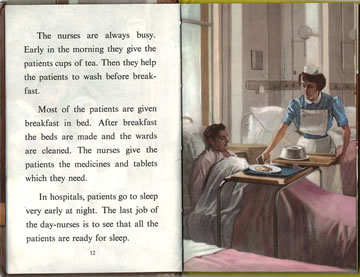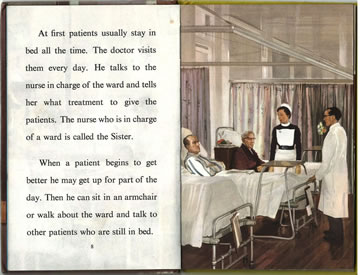Home News & Views Silence to voice: What is a nurse?
Silence to voice: What is a nurse?
 Grace Cook, FoNS Practice Development Facilitator
Grace Cook, FoNS Practice Development Facilitator
What does a nurse actually do?
My attention was bought to a quote that Professor Alison Leary shared during her keynote speech at the #BACCNConf2023, “Nurse mistake being liked for being respected”. This is from Suzanne Gordon and Bernice Buresh’s book ‘From Silence to Voice’, a book about nurses communicating what they do to the public. I decided to read this as my ‘book of the month’ and have been reflecting on why this is important and what this means going forward.
The book begins by setting the scene. Globally, nurses are trusted, but does anyone know what nurses actually do? This bought to mind a book Debbie Warren found in a charity shop, ‘what is a nurse?’ published in 1963. I re-read this not long ago, and at the time I have to admit it did make me laugh. I qualified as a nurse in 2013 and have worked various roles, none of which were represented in this book.


Between seeing this book and reading From Silence to Voice I realised that actually I have never really had to have the discussion about what I do as a nurse. I come from a family of nurses and most of my friends are nurses, they know what we do. I realised that the majority of the public don’t, and the vision of nursing remains the same as in this book.
This leads me to the question of what does a nurse do? This a much more complex question than it used to be. Nursing has diversified since this book was released and there is a lack of common professional identity across nursing roles. You may also ask why does this matter? If nurses are liked and trusted is that all they need? Well no, rephrasing the original quote completely, “liked is nice, but respect results in resources and without resources there is a major impact on patient safety”.
I believe one of the challenges in the perception of nursing is that it is seen as a gendered and feminine profession. This goes back hundreds of years ago where women who cared for others were seen as witches or religious healers and men were well respected community doctors. Within the religious orders, women were not supposed to talk about themselves as this was “boasting” and committing the sin of pride. Florence Nightingale was key in the professionalisation of nursing, but excluded men, famously stating that nursing work was not suitable for men. Nurses were seen as professionals who bought joy but were not allowed to have their own professional knowledge. This stigma of nursing remains today, with nursing being seen as “women’s work”, women being naturally kind, caring and compassionate. This is also shown through the view of nurses as “angels” and that nursing is a vocation for angels. But this means that we don’t often talk about what work we actually do and results in us remaining undervalued and under resourced.
So going back to the question of what do nurses actually do? As I began to write this blog, the Royal College of Nursing released their updated definition of nursing, which includes nurses as safety critical and decision makers, highlighting that what a nurse does is above and beyond being cheerful and kind to others. But the question remains, what can we do as individual nurses to highlight what our role looks like and move from being liked to being respected within a patriarchal society, and in turn help the public understand what we do? How do we sell nursing as the safety critical profession that it is? Silence to Voice advocates for explaining what we are doing and why, whilst we are doing it; for example, “I am checking your blood pressure to see if there have been any changes since we last did it in order to prevent you from becoming even more unwell”. When we are thanked, to acknowledge that and respond with, “I’m glad I was able to help you…” For example, “I am glad I was able to help you learn how to take your medication to help you manage your symptoms”. Highlighting what you have done and why.
One of the key messages I took away is that what is ordinary to you is extraordinary to the public and so we need to explain and sell that. This was summarised in Suzanne Gordon’s ending poem, Just a Nurse. Remember you are never “just a nurse”.
Resources
- If you would like to hear more about nursing as a feminist profession I would recommend the Florence Nightingale Foundation webinar presented by Leanne Patrick.
- Suzanne Gordon has recorded a From Silence to Voice Presentation with the Queens Nursing Institute
- RCN definition of nursing – RCN launches new definition of nursing | News | Royal College of Nursing
Comments are closed.

